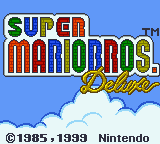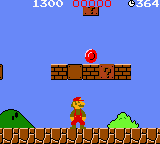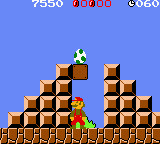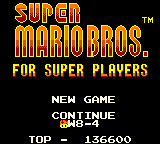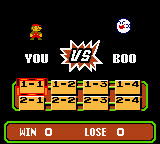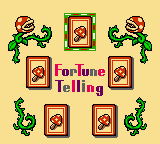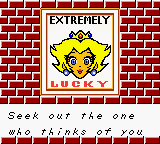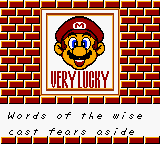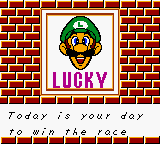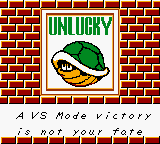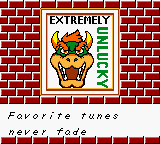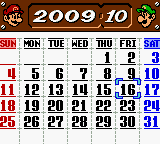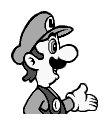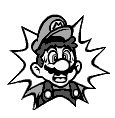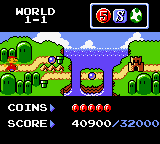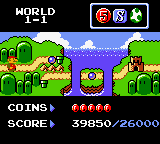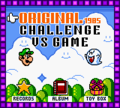Super Mario Bros. Deluxe: Difference between revisions
mNo edit summary |
Tags: Mobile edit Advanced mobile edit |
||
| (563 intermediate revisions by more than 100 users not shown) | |||
| Line 1: | Line 1: | ||
{{italic title}} | |||
{{FA}} | {{FA}} | ||
{{ | {{distinguish|New Super Mario Bros. U Deluxe}} | ||
| | {{game infobox | ||
| image = [[File: | |image=[[File:SMB Deluxe cover art.png|250px]] | ||
| developer = [[Nintendo]] | |developer=[[Nintendo Research & Development 2|Nintendo R&D2]] | ||
| publisher = [[Nintendo]] | |publisher=[[Nintendo]] | ||
| platforms = [[Game Boy Color]] | |platforms=[[Game Boy Color]], [[Virtual Console]] ([[Nintendo 3DS]]) | ||
|release='''Game Boy Color:'''<br>{{flag list|USA|May 10, 1999<ref>{{cite|deadlink=y|archive=web.archive.org/web/19990427031702/http://www.nintendo.com/gb/gamelist.html|title=Nintendo: Game Boy Game List|publisher=Nintendo of America|language=en-us|accessdate=May 31, 2024}}</ref><ref>{{cite|deadlink=y|archive=web.archive.org/web/20190725222407/https://66.media.tumblr.com/e8b85f3220a774247647054bf5e6e4ab/tumblr_inline_pk073qdYQ01sjv6be_500.jpg|title=Game Boy Color News Release sheet|publisher=Nintendo of America|language=en-us|accessdate=May 31, 2024}}</ref>|Europe|July 1, 1999<ref>https://www.nintendo.com/fr-fr/Jeux/Game-Boy-Color/Super-Mario-Bros-Deluxe-266219.html</ref><ref>https://www.nintendo.com/de-de/Spiele/Game-Boy-Color/Super-Mario-Bros-Deluxe-266219.html</ref><ref>https://www.nintendo.com/it-it/Giochi/Game-Boy-Color/Super-Mario-Bros-Deluxe-266219.html</ref>|Australia|July 1, 1999{{ref needed}}|Japan|March 1, 2000 ([[Nintendo Power (cartridge)|NP]])<ref>{{cite|language=ja|url=www.nintendo.co.jp/n02/dmg/ahyj/index.html|title=SUPER MARIO BROS. DX|publisher=Nintendo|accessdate=May 31, 2024}}</ref>}} '''3DS Virtual Console (Promotional Release):'''<br>{{flag list|Japan|January 27, 2014<ref>{{cite|deadlink=y|archive=web.archive.org/web/20140130004254/http://www.nintendonews.com/2014/01/nintendo-japan-issuing-nintendo-network-id-campaign-download-codes|title=Nintendo Japan Issuing Nintendo Network ID Campaign Download Codes|publisher=Nintendo News|author=McMinn, Kevin|date=January 27, 2014|accessdate=May 31, 2024}}</ref>|Europe|February 13, 2014|Australia|February 13, 2014}} '''3DS Virtual Console (Full Release):'''<br >{{flag list|Europe|February 27, 2014|Australia|February 28, 2014|USA|December 25, 2014<ref>{{cite|deadlink=y|archive=web.archive.org/web/20170121082356/http://www.nintendo.com/games/detail/super-mario-bros-deluxe-3ds|title=Super Mario Bros. Deluxe for Nintendo 3DS - Nintendo Game Details|publisher=Nintendo of America|language=en-us|accessdate=May 31, 2024}}</ref>|South Korea|May 4, 2016}} | |||
| | |languages={{languages|en_us=y}} | ||
| genre = Platformer | |genre=[[Genre#Platform games|Platformer]] | ||
| modes = | |modes=1–2 players | ||
| ratings = | |ratings={{ratings|esrb=E|pegi=3|cero=A|acb=G}} | ||
| | |format={{format|gbc=1|3dsdl=1}} | ||
| | |input={{input|gbc=1|3ds=1}} | ||
| | |serials={{flag list|USA|CGB-AHYE-USA (v1.0)|USA|CGB-AHYE-USA-1 (v1.1)|USA|CGB-AHYE-USA-2 (v1.2; VC)|Europe|CGB-AHYP-EUR (AHYE)|Japan|CGB-AHYJ-JPN}} | ||
}} | }} | ||
'''''Super Mario Bros. Deluxe''''' | '''''Super Mario Bros. Deluxe''''' is a [[Genre#Platform games|platform game]] released on the [[Game Boy Color]] in 1999 as a [[reissue|remake]] of the 1985 game ''[[Super Mario Bros.]]'', as well as an unlockable remake of its sequel, ''[[Super Mario Bros.: The Lost Levels]]''. The game in Japan was released on a [[Nintendo Power (cartridge)|Nintendo Power]] cartridge instead of the usual {{iw|nwiki|Game Pak}} format. This game was initially released for the [[Nintendo 3DS|3DS]]'s [[Virtual Console#Nintendo 3DS|Virtual Console]] in Japan, Europe, and Australia in 2014, as part of a special offer, and was later available to download for everyone in Europe, Australia, and North America with an added cost.<ref>{{cite|url=www.cubed3.com/news/22959/1/more-classic-mario-games-coming-to-virtual-console.html|title=More Classic Mario Games Coming to Virtual Console|date=December 21, 2014|publisher=Cubed3|accessdate=May 31, 2024|language=en}}</ref> The Virtual Console release requires 51 blocks (6.5 MB) of memory to be installed. | ||
The game received critical acclaim for a number of reasons, including | The game received critical acclaim for a number of reasons, including bringing back the original ''Super Mario Bros.'' for a whole younger generation to experience, especially to a handheld that allowed players to enjoy ''Super Mario Bros.'' wherever they went, the inclusion of the previously rarely seen ''Super Mario Bros.: The Lost Levels'', and the great abundance of featured unlockables. | ||
This game also serves as a precursor for the [[Super Mario Advance (series)|''Super Mario Advance'' series]] of rereleases, and ''[[Super Mario 64 DS]]'' as a classic title with additional features. | |||
==Story== | |||
The story for ''[[Super Mario Bros.]]'' and ''[[Super Mario Bros.: The Lost Levels]]'' are exactly the same as in their original releases, but present minor alterations. The plot follows like this, as detailed on the game's manual:<ref>{{cite|title=''Super Mario Bros. Deluxe'' instruction booklet|page=2-3|date=1999|language=en-us|publisher=Nintendo of America}}</ref> | |||
<blockquote> | |||
Once upon a time, the peaceful [[Mushroom Kingdom]] was invaded by the [[Koopa (species)|Koopa]], a tribe of turtles famous for their dark magic. These terrible terrapins transformed the peace loving [[Toad (species)|Mushroom People]] into stones, bricks, and ironically, mushrooms, then set their own evil king on the throne. In the wake of the ghastly coup d'etat, the beautiful Mushroom Kingdom fell into ruin and despair. | |||
It is said that only the daughter of the [[Mushroom King]], [[Princess Peach|Princess Toadstool]], can break the evil spell and return the inhabitants of Mushroom kingdom to their normal selves. | |||
But the [[Bowser|King of the Koopas]], knowing of this prophecy, kidnapped the lovely Princess and hid her away in one of his castles. | |||
Word of the terrible plight of the Mushroom People quickly spread throughout the land, eventually reaching the ears of a humble plumber. The simple, yet valiant [[Mario]] vowed to rescue the Princess and free her subjects from King Koopa's tyrannous reign. But can Mario really overcome the many obstacles facing him and become a true hero? | |||
</blockquote> | |||
{{br}} | |||
==Controls== | |||
*{{button|Gbc|A}}: Jump | |||
*{{button|gbc|B}}: Sprint/Fire (Fiery Mario) | |||
*{{button|Gbc|Pad}}: Move | |||
*{{button|gbc|Start}}: Pause / Select option | |||
*{{button|Gbc|Select}}: Choose options | |||
*(Hold) {{button|Gbc|Pad}} + {{button|gbc|B}}: Run | |||
==Game modes== | |||
[[File:SMBDX Title Screen.png|thumb|The title screen]] | |||
===Original 1985=== | |||
This is the first mode of the game that the player will encounter. It is a nearly exact replica of the 1985 edition of ''Super Mario Bros.'', having only a few changes. The player will once again have to travel through eight [[world]]s, each containing four [[level]]s. There are three save files to choose from. The player can use {{button|gbc|start}} to either save or quit the game. | |||
====Differences between versions==== | |||
*The game physics are somewhat tighter than in the original version. | |||
*The player begins a game with five lives, instead of just three like the original game (as in ''[[Super Mario Bros. 3]]'' and ''[[Super Mario World]]''). They may also begin with ten lives with the [[#Fortune Teller|Fortune Teller]]. | |||
*The [[Fire Flower]] has a slightly altered palette. | |||
*Many [[List of Super Mario Bros. glitches|glitches]] from the original game were fixed for ''Super Mario Bros. Deluxe''. As such, well-known glitches such as the [[Minus World]] glitch cannot be performed, although the [[List of Super Mario Bros. glitches#Simultaneous death and completion glitch|Small Fiery Mario]] glitch can be done in the Japanese version of the game.<ref>{{cite|url=www.youtube.com/watch?v=jZwPv1uZT-s|author=Pokemon Glitching And More|title=Super Mario Bros Deluxe How To Get Small Fire Mario or Luigi|date=August 10, 2014|publisher=YouTube|accessdate=May 31, 2024}}</ref> | |||
*The player can save the game at any time. As in the ''[[Super Mario All-Stars]]'' version of ''[[Super Mario Bros.: The Lost Levels]]'', the game saves the current level, rather than just the current world. | |||
*The music is of a slightly worse quality due to the inferior bitrate of the Game Boy Color. | |||
*A world map has been added for each world, displaying the player's progress in the game. | |||
**On a similar note, after beating a castle in each world, a brief cinematic is shown of Mario jumping repeatedly on a castle to make it collapse, similar to in ''Super Mario Bros. 3'' and ''Super Mario World''. | |||
*Due to the lack of a 2-Player mode, the player can switch between [[Mario]] and [[Luigi]] during the game by pressing the {{Button|gbc|select}} button on the world map. | |||
*Water in ground courses and [[lava]] are animated. In the original version, they were a static part of the background. | |||
*[[Princess Peach|Princess Toadstool]] and [[Toad (species)|Mushroom Retainer]]s have talking animations. Additionally, when Peach is rescued in the final castle levels, she approaches Mario or Luigi and gives him a kiss after thanking him (with her either kneeling down or standing on her toes to kiss them depending on whether they are in small form or in Super/Fiery form when they rescue her). | |||
*The first sentence of the Mushroom Retainers' dialogue has a comma added after "you". | |||
*Luigi's sprite palette has been changed. In the original version, Luigi wore a white hat and a green shirt with white overalls, and Fiery Luigi looked identical to [[Fire Mario|Fiery Mario]]. In ''Super Mario Bros. Deluxe'', Luigi's palette was changed to reflect that of Mario's. As such, Luigi has Mario's palette, but with green instead of red, and Fiery Luigi has his original normal colors, but with a darker green. | |||
*Similarly, the gray [[Cheep Cheep|Cheep-cheep]]s now appear green. The gray appearance in the original is actually due to graphics with the typical "green" palette appearing as gray underwater. | |||
*Various sounds were added for various actions that were silent in the original. For instance, the [[Trampoline|Jumping Board]] makes sounds when Mario jumps on it, a sound is made whenever [[Lakitu]] tosses a [[Spiny Egg]], Mario makes skidding sounds when he reverses while walking (much like in ''Super Mario Bros.: The Lost Levels''), Cheep-cheeps make a noise before they jump, and finally, just as in the ''Super Mario All-Stars'' version, a chime or buzz will sound depending on whether Mario takes the correct path in [[World 4-4 (Super Mario Bros.)|Worlds 4-4]] and [[World 7-4 (Super Mario Bros.)|7-4]]. | |||
*Because the Game Boy Color has a smaller screen resolution than the [[Family Computer]] and [[Nintendo Entertainment System]], the visible playing space is cropped, which results in some course elements being off-screen that would be on-screen in the original. This adds a degree of difficulty in some stages like [[World 1-3 (Super Mario Bros.)|World 1-3]], but to compensate, the player is able to backtrack in the course a little bit, and can adjust the camera by pressing up or down on {{Button|gbc|Pad}} or {{button|gbc|select}}. | |||
**Due to this, the HUD is also condensed: | |||
***Only the score, coins, and time are shown during levels. Mario's/Luigi's lives and current level are now shown on the new Pause screen. | |||
***The score lacks redundant zeroes at the left of numbers. | |||
***The word "Time" is replaced by a small clock symbol. | |||
*Much like in ''Super Mario All-Stars'', if the player ran out of time as Fiery Mario, then the resulting dead Mario sprite will not have Fiery Mario's colors. | |||
===Challenge=== | |||
[[File:SMBDX Red Coin Challenge.png|thumb|left|Mario finding a Red Coin in Challenge mode.]] | |||
[[File:SMBDX Yoshi Egg Challenge.png|thumb|Mario finding the hidden Yoshi Egg of World 1-1 in Challenge mode.]] | |||
This mode allows the player to travel through any one of the 32 levels of ''Super Mario Bros.'' of their choosing, only this time, the player must collect [[Red Coin]]s and [[Yoshi's Egg|Yoshi Egg]]s, and try to get higher scores to unlock Medals. The player can also unlock additional pictures and awards to view in the Toy Box if they do exceptionally well. In each level, five Red Coins are hidden, either replacing some regular [[coin]]s (including some in [[Coin Block]]s), or in new locations. The Yoshi Egg is in an invisible block that is hidden somewhere in the level; the player may get a clue as to where Yoshi Eggs are hidden by choosing Yoshi in the Toy Box. High scores may be attained through the usual methods, with each level having a target score that awards a Score Medal. The targets are lower in the Japanese version of the game. There are some differences in scoring between Challenge Mode and the original game: | |||
*[[1-Up Mushroom|1-up Mushroom]]s are worth 2,000 points. | |||
*If the player would ordinarily receive a 1-Up from kicking a shell or stomping an enemy, they will receive 10,000 points instead. | |||
*If an infinite 1-Up stomp trick is used, such as at the staircase at the end of 3-1, the Koopa Troopa or Buzzy Beetle will be killed after the 10,000 point bonus is earned. | |||
*If the player gets every coin in a [[Coin Heaven|Bonus Stage]], the screen will display "Perfect Bonus" and award 10,000 points. | |||
Additionally, the score from each level is summed and displayed on the level select screen with a progress bar, which completely fills at 1,160,000 points (much higher than the total of all required scores for Score Medals). Filing the bar will earn the player an award. | |||
{{br}} | |||
===''Super Mario Bros. for Super Players''=== | |||
[[File:SMB Super Players GBC title screen.png|thumb|Title screen]] | |||
After earning a total of 300,000 points in Original 1985 mode, the '''''Super Mario Bros. for Super Players''''' mode is unlocked. This mode is a remake of ''[[Super Mario Bros.: The Lost Levels]]'', and unlike the "Original 1985" mode, it only has one save slot. | |||
Some adjustments were made from the original game. Worlds [[World 9 (Super Mario Bros.: The Lost Levels)|9]] through [[World D (Super Mario Bros.: The Lost Levels)|D]] are left unused in the game (though they do exist in the ROM). The [[wind]] feature and Luigi's unique physics were also removed, so certain levels had been altered to make it possible to go across some of the gaps. | |||
In [[World 7-1 (Super Mario Bros.: The Lost Levels)|World 7-1]] and [[World 8-1 (Super Mario Bros.: The Lost Levels)|World 8-1]], it is no longer possible to receive a 1-Up by touching the flagpole when the coin count is a multiple of 11, with the digits matching the timer's last digit upon level completion. | |||
[[ | |||
=== | ===High Scores=== | ||
By utilizing the Game Boy Color infrared port, two players can view and exchange each other's high scores on levels and game modes. Because the Nintendo 3DS uses different infrared technology from the Game Boy Color, it is not possible to exchange scores in the [[Virtual Console]] version. | |||
{{br}} | |||
=== | ===You VS. Boo=== | ||
[[File: | [[File:You VS Boo title screen.png|thumb|You VS. Boo menu]] | ||
After earning a total of 100,000 points in Original 1985 mode, the '''You VS. Boo'''<ref>{{cite|title=''Super Mario Bros. Deluxe'' instruction booklet|page=20|date=1999|language=en-us|publisher=Nintendo of America}}</ref> mode is unlocked. This mode is extremely similar to VS Game in multiplayer, only this time, the player must race against a Boo. The Boo has a major advantage over the player, as it can pass through walls and obstacles without slowing down. However, the player is given option to start the race as Super Mario or Fiery Mario by pressing the {{Button|gbc|select}} button. The player will then have to race against the Boo on a particular stage. Each stage is modeled after a certain level in the game, only with some modifications. [[Springboard]]s and blocks inhabit the courses mostly, as the player is required to utilize these to traverse the course successfully. The player does not take damage from touching a Boo, because it is a competitor. | |||
The Boo opponent appears in different colors. Depending on how quickly a level is finished, this determines if the Boo of the current color will float away, and if it is replaced with a [[Green Boo]], a [[Red Boo]], or a [[Black Boo]]. Each upgraded color will move considerably faster than the previous ones, and the Boo will move at a pace to reach a pre-determined finish time that correspond to its color. Beating the current color may not be sufficient to upgrade to a new color at all, if the finish times between Mario and Boo were too close. The Black Boo's speed is relative to the player's best time, so beating the Black Boo makes him faster the next time he is challenged. When the personal best time of a level is deleted, the opponent is reverted to the default white Boo. | |||
A major part of the eight available levels is the [[Face Block (switch)|Face Block]] and the very similar [[3-2-1 Block]]s, neither of which appear in the main game. Jumping into a Face Block or 3-2-1 will toggle whether [[Dotted-Line Block]]s or [[Spike Trap]]s are activated or not. The former can be toggled by jumping into them, but will be automatically toggled on at strategic times, whereas the latter will toggle every three seconds but can also be toggled the same way as for Face Blocks. There are almost no enemies except a few [[Piranha Plant]]s and [[Impostor Bowser|fake Bowsers]]. | |||
=== | ====Levels==== | ||
[[File:SMBDX | {|class="wikitable" style="text-align:center" | ||
== | !Screenshot!!Level!!Summary | ||
|- | |||
|[[World 1-1 (VS Game)|World 1-1]] | |||
|[[File:SMBDX VS Game World 1-1.png|160px]] | |||
|align=left|An overworld level with large and extensive Face Block sections. | |||
|- | |||
|[[World 1-2 (VS Game)|World 1-2]] | |||
|[[File:SMBDX VS Game 1-2.png|160px]] | |||
|align=left|An underground level with design cues from [[World 1-2 (Super Mario Bros.)|World 1-2]], including a fake version of its [[Warp Zone]]. | |||
|- | |||
|[[World 1-3 (VS Game)|World 1-3]] | |||
|[[File:321BlockDeluxe.png|160px]] | |||
|align=left|An overworld level with design cues from [[World 2-3 (Super Mario Bros.)|World 2-3]] and [[World 4-3 (Super Mario Bros.)|World 4-3]], with the bridge sections having no Cheep-cheeps and are two-layer with Dotted-Line Blocks on the top lane and cloud platforms below. | |||
|- | |||
|[[World 1-4 (VS Game)|World 1-4]] | |||
|[[File:SMBDX VS Game 1-4.png|160px]] | |||
|align=left|A castle-themed level with design cues from [[World 1-4 (Super Mario Bros.)|World 1-4]] and [[World 3-4 (Super Mario Bros.)|World 3-4]], but with no [[Fire Bar|Fire-Bar]]s or [[Lava Bubble|Podoboo]]s, and has a Face Block labyrinth. | |||
|- | |||
|[[World 2-1 (VS Game)|World 2-1]] | |||
|[[File:SMBDX VS Game 2-1.png|160px]] | |||
|align=left|An overworld level with fairly normal gameplay, but also has two sections with many small [[trampoline]]s. | |||
|- | |||
|[[World 2-2 (VS Game)|World 2-2]] | |||
|[[File:SMBDX VS Game World 2-2 Goal Pole.png|160px]] | |||
|align=left|An underwater level similar to [[World 2-2 (Super Mario Bros.)|World 2-2]]. It has narrow passages to swim through and Spike Traps to get past. | |||
|- | |||
|[[World 2-3 (VS Game)|World 2-3]] | |||
|[[File:SMBDX VS Game 2-3.png|160px]] | |||
|align=left|A level based on [[World 3-3 (Super Mario Bros.)|World 3-3]] that has many walls and gaps to jump over, many of them with Spike Traps. | |||
|- | |||
|[[World 2-4 (VS Game)|World 2-4]] | |||
|[[File:SMBDX VS Game 2-4.png|160px]] | |||
|align=left|A castle level with several Spike Trap clusters, and a mid-section with many blocks spread around and unusual gaps. | |||
|} | |||
=== | ===VS Game=== | ||
This mode | This mode is almost the same as You VS. Boo, but it is not available on the 3DS Virtual Console port, due to no multiplayer support. By utilizing the Game Boy Color Link, two players can race head-to-head on a particular level. The levels are laid out identically to those featured in You VS. Boo mode. It is necessary to play this mode at least once to unlock two graphics in the Album. Only a few differences can be found between VS Game and You VS. Boo: | ||
*Boo will not be found on any level as opponents. | |||
*The players can use the Face Blocks to try to trap their opponents. | |||
*Face Blocks do not turn themselves on automatically, as there is a human opponent that is able to toggle them. | |||
*If Mario and Luigi loses a life simultaneously, the player with the most coins wins.<ref>{{cite|url=www.nintendo.co.jp/n02/dmg/ahyj/vs.html|title=VS GAME|accessdate=August 2, 2024|date=2000|language=ja|publisher=Nintendo of Japan}}</ref> | |||
===Toy Box=== | ===Toy Box=== | ||
The Toy Box contains a large variety of different toys for the player to use. The majority of the items in the Toy Box must be unlocked, generally through game completion. | The Toy Box contains a large variety of different toys for the player to use. The majority of the items in the Toy Box must be unlocked, generally through game completion. | ||
{{br}} | |||
====Fortune Teller==== | ====Fortune Teller==== | ||
[[File:SMBDX Fortune Screen.png|thumb|The main screen for the Fortune Teller.]] | |||
The Fortune Teller is a bonus mode that is accessible from the very start of the game. The player enters the Fortune Teller, pick a random card, and receive a fortune. There are five different varieties of fortunes: Extremely Lucky, Very Lucky, Lucky, Unlucky, and Extremely Unlucky. The only way that the Fortune Teller can actually affect gameplay is if the player receives | The Fortune Teller is a bonus mode that is accessible from the very start of the game. The player enters the Fortune Teller, pick a random card, and receive a fortune. There are five different varieties of fortunes: Extremely Lucky, Very Lucky, Lucky, Unlucky, and Extremely Unlucky. The only way that the Fortune Teller can actually affect gameplay is if the player receives an Extremely Lucky fortune and starts a new file; they start the new game with 10 lives, instead of just five. | ||
< | <gallery widths=160 heights=144> | ||
SMBDX Fortune Teller 5.png|An extremely lucky fortune | |||
SMBDX Fortune Teller.png|A very lucky fortune | |||
SMBDX Fortune Teller 2.png|A lucky fortune | |||
SMBDX Fortune Teller 3.png|An unlucky fortune | |||
SMBDX Fortune Teller 4.png|An extremely unlucky fortune | |||
</gallery> | |||
====Mystery Room==== | ====Mystery Room==== | ||
The Mystery Room (or ? Room) is perhaps the most well-developed secret in the Toy Box. It contains a total of eight different options for the player to choose from. Each must be unlocked by rescuing a captive from a castle in Original 1985 mode. Whenever a | The Mystery Room (or ? Room) is perhaps the most well-developed secret in the Toy Box. It contains a total of eight different options for the player to choose from. Each must be unlocked by rescuing a captive from a castle in Original 1985 mode. Whenever a Mushroom Retainer (or Princess Peach, as the case may be) is rescued from a castle, they will show up in the Mystery Room. | ||
*'''World 1-4 | *'''World 1-4 Mushroom Retainer''': Shows the player banners to print out on the Game Boy Printer. | ||
*'''World 2-4 | *'''World 2-4 Mushroom Retainer''': Shows the player animations. | ||
*'''World 3-4 | *'''World 3-4 Mushroom Retainer''': Shows the player banners to print out on the Game Boy Printer. | ||
*'''World 4-4 | *'''World 4-4 Mushroom Retainer''': Shows the player animations. | ||
*'''World 5-4 | *'''World 5-4 Mushroom Retainer''': Shows the player various graphics available for printing. | ||
*'''World 6-4 | *'''World 6-4 Mushroom Retainer''': Shows the player a certain mode that allows them to create a sort of story. | ||
*'''World 7-4 | *'''World 7-4 Mushroom Retainer''': Shows the player banners to print out on the Game Boy Printer. | ||
*'''Princess Peach''': Shown an introduction screen editor where the player can replace the "''Super Mario Bros'': since 1985." title screen with different images, and add custom text. | *'''Princess Peach''': Shown an introduction screen editor where the player can replace the "''Super Mario Bros'': since 1985." title screen with different images, and add custom text. Can also be used to change the song heard in the title screen. | ||
====Calendar==== | ====Calendar==== | ||
[[File:SMBDX Calendar. | [[File:SMBDX Calendar.png|thumb|left|The Calendar]] | ||
The Calendar | The Calendar is the only other feature that is located in the Toy Box to be accessible from the very start of the game. The main function of the calendar is to keep track of the days. The player could mark certain days on the calendar if they were a specific event, such as a birthday. The player can only mark 12 dates on the whole calendar. If the player wants to try to mark another, one of the dates has to be erased. It always has the same music as the Main Menu music. | ||
====Yoshi | ====Yoshi Is Here!==== | ||
By finding at least one Yoshi Egg in Challenge Mode, the player will unlock | By finding at least one Yoshi Egg in Challenge Mode, the player will unlock "Yoshi Is Here!", an optional feature helps the player find other Yoshi Eggs in various levels of Challenge Mode. It operates like a roulette, flashing random levels at a high speed. When the player presses {{Button|gbc|A}}, the screens will stop flipping. A brief snapshot will be shown of an area in a specified level, indicating that the level's Yoshi Egg can be found there; it is often near an object that did not appear in the original level. This mode has the same music as the Mystery Room menu. | ||
{{br}} | |||
==Album== | ==Album== | ||
==== | ===Awards=== | ||
{|class=wikitable width=50% | |||
!Image | |||
!How to unlock | |||
!In-game comment | |||
|-align=center | |||
|[[File:SMBDX Bowser Award.png]]<br>Bowser Award | |||
|Complete the Second Quest of ''Super Mario Bros.'' | |||
|''You finished the Star courses!'' | |||
|-align=center | |||
|[[File:SMBDX Mario Award.png]]<br>Mario Award | |||
|Beat [[World 8-4 (Super Mario Bros.)|World 8-4]] of ''Super Mario Bros.'' | |||
|''Hooray! You cleared World 8-4!'' | |||
|-align=center | |||
|[[File:SMBDX Peach Award.png]]<br>Peach Award | |||
|Get all Red Coins, High Score Medals, and Yoshi Eggs in Challenge Mode | |||
|''You received all Challenge Medals!'' | |||
|-align=center | |||
|[[File:SMBDX Toad Award.png]]<br>Toad Award | |||
|Fill the total score meter on Challenge Mode (1,160,000 points) | |||
|''You exceeded the Challenge Score!'' | |||
|-align=center | |||
|[[File:SMBDX Yoshi Award.png]]<br>Yoshi Award | |||
|Beat [[World 8-4 (Super Mario Bros.: The Lost Levels)|World 8-4]] of ''Super Mario Bros. for Super Players'' | |||
|''You completed the Extra Courses!'' | |||
|} | |||
{| | ===Printable icons=== | ||
|- | Every printable icon is unlocked when Mario or Luigi rescue a [[Toad (species)|Toad]] in [[World 5-4 (Super Mario Bros.)|World 5-4]] of the "Original 1985" mode (''Super Mario Bros.''). They can be printed from the [[Game Boy#Game Boy Printer|Game Boy Printer]]. | ||
! | <gallery heights=130> | ||
|- | SMBDX Mario Icon.png | ||
|[[File:SMBDX | SMBDX Luigi Icon.png | ||
|- | SMBDX Peach Icon.png | ||
|[[File:SMBDX | SMBDX Toad Icon.png | ||
|- | SMBDX Yoshi Icon.png | ||
|[[File:SMBDX | SMBDX Bowser Icon.png | ||
|- | SMBDX N64 Icon.png | ||
|[[File:SMBDX | SMBDX Only For Icon.png | ||
|- | </gallery> | ||
|[[File:SMBDX | |||
| | ===Pictures=== | ||
{|class=wikitable width=75% | |||
!Image | |||
!How to unlock | |||
!In-game comment | |||
|-align="center" | |||
|[[File:SMBDX Fireworks Pic.png]] | |||
|Make the [[Fireworks|Fireworks Show]] go off on at least one level | |||
|''A Fireworks Show just for you!'' | |||
|-align="center" | |||
|[[File:SMBDX Mario Getting 1-Up Mushroom Pic.png]] | |||
|Collect a [[1-Up Mushroom|1-up Mushroom]] | |||
|''All right! You got a 1-up Mushroom!'' | |||
|-align="center" | |||
|[[File:SMBDX Vine Pic.png]] | |||
|Climb a [[beanstalk]] and enter a [[Coin Heaven|Bonus Stage]] | |||
|''You found the Bonus Stage!'' | |||
|-align="center" | |||
|[[File:SMBDX Bros Pic.png]] | |||
|Play multiplayer mode with a friend once. ''(This image can not be rewarded in the 3DS Virtual Console port.)'' | |||
|''You played your first VS GAME!'' | |||
|-align="center" | |||
|[[File:SMBDX Kiss Pic.png]] | |||
|Complete ''Super Mario Bros.'' | |||
|''You're a hero! You rescued Peach!'' | |||
|-align="center" | |||
|[[File:SMBDX Toad Pic.png]] | |||
|Use the infrared link at least once. ''(This image can not be rewarded in the 3DS Virtual Console port.)'' | |||
|''You traded High Scores! Way to go!'' | |||
|-align="center" | |||
|[[File:SMBDX Mario Coin Pic.png]] | |||
|Find all [[Red Coin]]s in Challenge mode | |||
|''Good job! You got all the Red Coins!'' | |||
|-align="center" | |||
|[[File:SMBDX Mario Pic.png]] | |||
|Get all the High Score Medals in Challenge mode | |||
|''You got all the High Score medals!'' | |||
|-align="center" | |||
|[[File:SMBDX Yoshi Pic.png]] | |||
|Find all of the Yoshi Eggs in Challenge mode | |||
|''Wow! You found all the Yoshi Eggs!'' | |||
|-align="center" | |||
|[[File:SMBDX Goomba Pic.png]] | |||
|Defeat a [[Goomba]] | |||
|''You stomped a Goomba!'' | |||
|-align="center" | |||
|[[File:SMBDX Blooper Pic.png]] | |||
|Defeat a [[Blooper|Bloober]] | |||
|''Way to go! You beat a Bloober!'' | |||
|-align="center" | |||
|[[File:SMBDX Lakitu Pic.png]] | |||
|Defeat a [[Lakitu]] | |||
|''You knocked Lakitu off his cloud!'' | |||
|-align="center" | |||
|[[File:SMBDX Cheep Pic.png]] | |||
|Defeat a [[Cheep Cheep|Cheep-cheep]] | |||
|''You beat a Cheep-cheep! Nice work!'' | |||
|-align="center" | |||
|[[File:SMBDX Hammer Pic.png]] | |||
|Defeat a [[Hammer Bro]] | |||
|''You defeated the Hammer Bros!'' | |||
|-align="center" | |||
|[[File:SMBDX Bill Pic.png]] | |||
|Defeat a [[Bullet Bill]] | |||
|''You stomped Bullet Bill! All right!'' | |||
|-align="center" | |||
|[[File:SMBDX Koopa Pic.png]] | |||
|Defeat a [[Koopa Troopa]] | |||
|''Great! You toppled a Koopa Troopa!'' | |||
|-align="center" | |||
|[[File:SMBDX Spiny Pic.png]] | |||
|Defeat a [[Spiny]] | |||
|''You defeated a Spiny! Yippee!'' | |||
|-align="center" | |||
|[[File:SMBDX Buzzy Pic.png]] | |||
|Defeat a [[Buzzy Beetle]] | |||
|''Good job! You beat a Buzzy Beetle!'' | |||
|-align="center" | |||
|[[File:SMBDX Bowser Pic.png]] | |||
|Defeat the first four [[Impostor Bowser|fake Bowsers]] with [[fireball]]s in ''Super Mario Bros.'' The player unlocks a quarter of the picture for each Bowser defeated with fireballs. | |||
|''You blazed the first 4 Bowsers!'' | |||
|-align="center" | |||
||[[File:SMBDX Bros Handshake.png]] | |||
|Defeat the last three fake Bowsers and the real Bowser with fireballs in ''Super Mario Bros.'' The player unlocks a quarter of the picture for each Bowser defeated with fireballs. | |||
|''You blazed the last 4 Bowsers!'' | |||
|} | |} | ||
=== | ===Story Mode artwork=== | ||
All of the Story Mode artwork is unlocked when Mario or Luigi rescue the Toad in [[World 6-4 (Super Mario Bros.)|World 6-4]] of the "Original 1985" mode (''Super Mario Bros.''). These images can be printed with the Game Boy Printer. | |||
| | <gallery> | ||
! | SMBDX Bowser.png | ||
|- | SMBDX Goomba.png | ||
|[[File:SMBDX | SMBDX Luigi.png | ||
|- | SMBDX Lovesick Mario.png | ||
|[[File:SMBDX | SMBDX Mario Shocked.png | ||
|- | SMBDX Peach.png | ||
|[[File:SMBDX | SMBDX Peach Walk.png | ||
|- | SMBDX Toad.png | ||
|[[File:SMBDX | SMBDX Yoshi.png | ||
|- | </gallery> | ||
|[[File:SMBDX | |||
|- | ===Game Boy Printer banners=== | ||
|[[File:SMBDX | Each banner is unlocked by rescuing a [[Toad (species)|Mushroom Retainer]] from one of the castle levels. | ||
|- | {|class=wikitable width=50% | ||
|[[File:SMBDX | !width=10%|Image | ||
|- | !How to unlock | ||
|-align="center" | |||
|[[File:SMBDX Question Banner 4.png]] | |||
|rowspan=5|Rescue the Mushroom Retainer in [[World 1-4 (Super Mario Bros.)|the first castle]] of ''Super Mario Bros.'' | |||
|-align="center" | |||
|[[File:SMBDX Question Banner 3.png]] | |||
|-align="center" | |||
|[[File:SMBDX Question Banner 2.png]] | |||
|-align="center" | |||
|[[File:SMBDX Question Banner 1.png]] | |||
|-align="center" | |||
|[[File:SMBDX Question Banner 5.png]] | |||
|-align="center" | |||
|[[File:SMBDX GB Banner.png]] | |||
|rowspan=5|Rescue the Mushroom Retainer in [[World 3-4 (Super Mario Bros.)|the third castle]] of ''Super Mario Bros.'' | |||
|-align="center" | |||
|[[File:SMBDX SMB Banner.png]] | |||
|-align="center" | |||
|[[File:SMBDX N64 Banner.png]] | |||
|-align="center" | |||
|[[File:SMBDX Nintendo Banner.png]] | |||
|-align="center" | |||
|[[File:SMBDX NES Banner.png]] | |||
|-align="center" | |||
|[[File:SMBDX Favorites Banner.png]] | |||
|rowspan=4|Rescue the Mushroom Retainer in [[World 7-4 (Super Mario Bros.)|the seventh castle]] of ''Super Mario Bros.'' | |||
|-align="center" | |||
|[[File:SMBDX Dice Banner.png]] | |||
|-align="center" | |||
|[[File:SMBDX Cell Phone Banner.png]] | |||
|-align="center" | |||
|[[File:SMBDX Name Card Banner.png]] | |||
|} | |} | ||
== | ==Staff== | ||
{| | {{main|List of Super Mario Bros. Deluxe staff}} | ||
===Original Game Design=== | |||
*[[Shigeru Miyamoto]] | |||
*[[Takashi Tezuka]] | |||
| | ===Producer=== | ||
| | *Masayuki Uemura | ||
| | *Kazuhiko Taniguchi | ||
| | |||
|- | ===Supervisor=== | ||
*Shigeru Miyamoto | |||
*Takashi Tezuka | |||
*Toshihiko Nakago | |||
==Regional differences== | |||
{{multiple image | |||
|align=right | |||
|direction=horizontal | |||
|footer=The Challenge mode score for some levels, such as World 1-1, is higher in English versions (left) than the Japanese version (right). | |||
|width=160 | |||
|image1=SMBDX W1-1 Challenge.png | |||
|image2=SMBDX W1-1 Japan Challenge.png | |||
}} | |||
The Japanese version was released nearly a year after the North American and European versions, and features some enhancements over earlier versions. | |||
*In the Japanese release, when the player unlocks new album photos, a red and yellow-flashing icon reading "NEW" is shown next to the album icon from the mode select screen. | |||
*The photo fragments on pages 4 and 5 of the album are not unlocked by using fireballs to defeat the fake Bowsers and Bowser in original mode. Instead, the eight fragments are rewarded for every four [[Red Coin]]s collected in Challenge mode. | |||
*The Ranking scoreboard plays the same theme from when printing from a Game Boy Printer. | |||
*In the Japanese release, when saving the game progress, Mario and Luigi's current form and the player's current score are also saved. In the English version, when reopening a game, Mario and Luigi return to their [[Small Mario|small form]], and their score is reset to zero. | |||
*From the pause menu, if the player saves their game with a score high enough for the Records table, a large starburst saying "RANK IN!" appears. | |||
*Some names on the Ranking screen were changed to their romanized Japanese name. | |||
**"BOWSER" was changed to "KOOPA". | |||
**"BOO" was changed to "TERESA". | |||
**"LAKITU" was changed to "JUGEMU". | |||
| | **"TROOPA" was changed to "NOKO2" (short for [[Koopa Troopa]]'s Japanese name, Nokonoko). The "2" of the Ranking name is white, while "NOKO" is colored green. | ||
| | **"TOAD" was replaced by "PAKKUN" (short for [[Piranha Plant]]'s Japanese name for Pakkun Flower. | ||
**"GOOMBA" was changed to "KURIBO". | |||
*In the Japanese release, the Ranking scores can be reset if the player presses {{button|GBC|Start}}. | |||
*The Boo in the "You VS. Boo" mode was renamed to simply Ghost and has a different graphic. | |||
*The record time for each level in "You VS. Boo" is saved. | |||
*In Challenge mode, the minimum points requirement was changed for each of the first four worlds' levels, except [[World 2-3 (Super Mario Bros.)|World 2-3]] and [[World 3-4 (Super Mario Bros.)|World 3-4]]. | |||
|- | |||
== | ==Revision differences== | ||
*The Nintendo 3DS Virtual Console removes the ability to select Print or Trade in applicable menus. While the options show up, nothing happens when pressing {{button|3ds|A}} on the menu buttons. | |||
| | |||
| | |||
==== | ==Reception== | ||
{| style="text-align: center; | ''Super Mario Bros. Deluxe'' was very well-received by both fans and critics. | ||
|- style="background-color: | {|class="wikitable reviews" | ||
!colspan="4"style="font-size:120%;text-align:center;background-color:silver"|Reviews | |||
|-style="background-color:#E6E6E6" | |||
|Release | |||
|Reviewer, Publication | |||
|Score | |||
|Comment | |||
|- | |- | ||
|[[ | |[[Game Boy Color]] | ||
|Cameron Davis, [https://www.gamespot.com/reviews/super-mario-dx-review/1900-2536190/ GameSpot] | |||
|9.9/10 | |||
|align="left"|"''It looks like we finally have the "killer app" for the Game Boy Color, then. Worth buying a GBC just to play. Well done, Nintendo - now, where's Zelda and Metroid...?''" | |||
|- | |- | ||
|[ | |Game Boy Color | ||
|Craig Harris, [https://www.ign.com/articles/1999/07/22/super-mario-bros-deluxe IGN] | |||
|10/10 | |||
|align="left"|"''Super Mario Bros. remains one of my top 10 favorite games of all-time, even though it's almost a decade and a half old. Super Mario Bros. Deluxe is such a perfect translation, it makes me wonder if it's easy to port NES games to the Game Boy Color. Super Mario Bros. Deluxe is the Game Boy Color-specific game to own, hands down, and will be the title that, hopefully, will key a revolution of porting NES games to the handheld system. Buy this game. Now.''" | |||
|- | |- | ||
|[[ | |[[Nintendo 3DS]] | ||
|Marcel van Duyn, [https://www.nintendolife.com/reviews/3ds-eshop/super_mario_bros_deluxe_gbc Nintendo Life] | |||
|6/10 | |||
|align="left"|"''All in all, Super Mario Bros. Deluxe is both a hit and a miss. The newly added features and included edition of Lost Levels give you some bang for your buck, but the decreased field of vision — a throwback to the Game Boy Color's small screen — hinders enjoyment of all modes quite a lot. To those who have played the original game and are interested in Deluxe's bonuses — or to those who got the game as a freebie — this is quite a nice little experience, but to anybody simply looking to get a portable version of Super Mario Bros., the already available original NES version is probably the smarter option.''" | |||
|- | |- | ||
!colspan="4"style="background-color:silver;font-size:120%;text-align:center;"|Aggregators | |||
|-style="background-color:#E6E6E6" | |||
|colspan=2|Compiler | |||
|colspan=2|Platform / Score | |||
|- | |||
| | |||
| | |||
| | |||
|- | |- | ||
|colspan=2|GameRankings | |||
|colspan=2|[https://www.gamerankings.com/gbc/198850-super-mario-bros-deluxe/index.html 92.63%] | |||
|} | |} | ||
===Sales=== | |||
== | The game sold about 2.8 million copies in the United States.<ref>{{cite|deadlink=y|archive=web.archive.org/web/20040605003941/http://www.the-magicbox.com/Chart-USPlatinum.shtml|title=The Magic Box - US Platinum Chart Games|language=en|publisher=The Magic Box|accessdate=May 31, 2024}}</ref> | ||
{{ | |||
== | |||
==Gallery== | ==Gallery== | ||
{{main-gallery}} | |||
<gallery> | |||
SMBDX - Logo.png|The game's logo | |||
SMBDX - Mario and Luigi.png|Artwork of [[Mario]] and [[Luigi]] | |||
SMBDYoshiSprite.png|Sprite of [[Yoshi]] | |||
SMBDX mode select.png|The mode select screen | |||
</gallery> | |||
</gallery | |||
=== | ==Media== | ||
{{media table | |||
File | |file1=SMBDX Title.oga | ||
|title1=Title | |||
|file2=SMBDX Main Menu & Calendar.oga | |||
|title2=Main Menu / Calendar | |||
|file3=SMBDX Select File-Challenge Menu-Toy Box.oga | |||
|title3=Select File / Challenge Menu / Toy Box | |||
|file4=SMBDX Overworld Theme.oga | |||
|title4=Overworld Theme | |||
|file5=SMBDX Underground Theme.oga | |||
|title5=Underground Theme | |||
|file6=SMBDX Underwater Theme.oga | |||
|title6=Underwater Theme | |||
|file7=SMBDX Castle Theme.oga | |||
|title7=Castle Theme | |||
|file8=SMBDX Invincibility.oga | |||
|title8=Invincibility | |||
|file9=SMBDX Level Clear.oga | |||
|title9=Level Clear | |||
|file10=SMBDX Castle Clear.oga | |||
|title10=Castle Clear | |||
|file11=SMBDX Lose Life.oga | |||
|title11=Lose a Life | |||
|file12=SMBDX Ending.oga | |||
|title12=Ending | |||
|file13=SMBDX Credits.oga | |||
|title13=Credits (Super Players mode) | |||
}} | |||
==Trivia== | ==Trivia== | ||
* | *A 2001 patent filed by [[Nintendo]] for a gaming smartphone used ''Super Mario Bros. Deluxe'' as an example of a built-in game. The patent called the game "''Super Mario DX''".<ref>{{cite|url=patents.google.com/patent/US7069044|title=Patent Description|date=November 27, 2001|publisher=Google Patents|accessdate=May 31, 2024}}</ref> | ||
*Mario's in-game sprite still wears the same colored attire for his shirt and overalls as he did in the original; Luigi wears a new dark/light green outfit while his original colored attire is now Fiery Luigi's outfit. However, the game's artwork and cutscenes depict Mario and Luigi wearing the standard colors of their shirts and overalls since ''[[Super Mario Bros. 3]]''. | |||
==References== | ==References== | ||
<references/> | <references/> | ||
==External links== | |||
{{NIWA|NWiki=1|StrategyWiki=1}} | |||
{{TCRF}} | |||
*[http://web.archive.org/web/19990508034712/http://www.nintendo.com/gb/smb/ North American web page] (Wayback Machine) | |||
*[https://www.nintendo.co.jp/n02/dmg/ahyj/ Japanese website] | |||
{{SMB}} | |||
{{Super Mario games}} | |||
{{GBC}} | {{GBC}} | ||
{{ | {{Virtual Console}} | ||
[[Category:Mario | [[Category:Super Mario Bros. Deluxe|*]] | ||
[[Category: | [[Category:Super Mario Bros.|*]] | ||
[[Category:Games]] | [[Category:Games]] | ||
[[Category:Game Boy Color games]] | |||
[[Category:Platforming games]] | |||
[[Category:Remakes]] | [[Category:Remakes]] | ||
[[Category:1999 games]] | [[Category:1999 games]] | ||
[[Category:2000 games]] | |||
[[Category:Player's Choice]] | |||
[[Category:Virtual Console games]] | |||
[[de:Super Mario Bros. Deluxe]] | |||
[[it:Super Mario Bros. Deluxe]] | |||
Latest revision as of 13:36, November 29, 2024
- Not to be confused with New Super Mario Bros. U Deluxe.
| Super Mario Bros. Deluxe | |||||||||
|---|---|---|---|---|---|---|---|---|---|
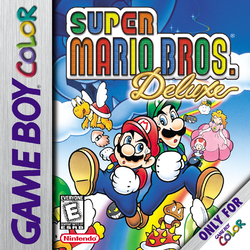 For alternate box art, see the game's gallery. | |||||||||
| Developer | Nintendo R&D2 | ||||||||
| Publisher | Nintendo | ||||||||
| Platform(s) | Game Boy Color, Virtual Console (Nintendo 3DS) | ||||||||
| Release date | Game Boy Color: 3DS Virtual Console (Promotional Release): 3DS Virtual Console (Full Release): | ||||||||
| Language(s) | English (United States) | ||||||||
| Genre | Platformer | ||||||||
| Rating(s) |
| ||||||||
| Mode(s) | 1–2 players | ||||||||
| Format | Game Boy Color:
Nintendo 3DS: | ||||||||
| Input | Game Boy Color:
Nintendo 3DS:
| ||||||||
| Serial code(s) | |||||||||
Super Mario Bros. Deluxe is a platform game released on the Game Boy Color in 1999 as a remake of the 1985 game Super Mario Bros., as well as an unlockable remake of its sequel, Super Mario Bros.: The Lost Levels. The game in Japan was released on a Nintendo Power cartridge instead of the usual Game Pak format. This game was initially released for the 3DS's Virtual Console in Japan, Europe, and Australia in 2014, as part of a special offer, and was later available to download for everyone in Europe, Australia, and North America with an added cost.[9] The Virtual Console release requires 51 blocks (6.5 MB) of memory to be installed.
The game received critical acclaim for a number of reasons, including bringing back the original Super Mario Bros. for a whole younger generation to experience, especially to a handheld that allowed players to enjoy Super Mario Bros. wherever they went, the inclusion of the previously rarely seen Super Mario Bros.: The Lost Levels, and the great abundance of featured unlockables.
This game also serves as a precursor for the Super Mario Advance series of rereleases, and Super Mario 64 DS as a classic title with additional features.
Story[edit]
The story for Super Mario Bros. and Super Mario Bros.: The Lost Levels are exactly the same as in their original releases, but present minor alterations. The plot follows like this, as detailed on the game's manual:[10]
Once upon a time, the peaceful Mushroom Kingdom was invaded by the Koopa, a tribe of turtles famous for their dark magic. These terrible terrapins transformed the peace loving Mushroom People into stones, bricks, and ironically, mushrooms, then set their own evil king on the throne. In the wake of the ghastly coup d'etat, the beautiful Mushroom Kingdom fell into ruin and despair.
It is said that only the daughter of the Mushroom King, Princess Toadstool, can break the evil spell and return the inhabitants of Mushroom kingdom to their normal selves.
But the King of the Koopas, knowing of this prophecy, kidnapped the lovely Princess and hid her away in one of his castles.
Word of the terrible plight of the Mushroom People quickly spread throughout the land, eventually reaching the ears of a humble plumber. The simple, yet valiant Mario vowed to rescue the Princess and free her subjects from King Koopa's tyrannous reign. But can Mario really overcome the many obstacles facing him and become a true hero?
Controls[edit]
: Jump
: Sprint/Fire (Fiery Mario)
: Move
: Pause / Select option
: Choose options
- (Hold)
+
: Run
Game modes[edit]
Original 1985[edit]
This is the first mode of the game that the player will encounter. It is a nearly exact replica of the 1985 edition of Super Mario Bros., having only a few changes. The player will once again have to travel through eight worlds, each containing four levels. There are three save files to choose from. The player can use to either save or quit the game.
Differences between versions[edit]
- The game physics are somewhat tighter than in the original version.
- The player begins a game with five lives, instead of just three like the original game (as in Super Mario Bros. 3 and Super Mario World). They may also begin with ten lives with the Fortune Teller.
- The Fire Flower has a slightly altered palette.
- Many glitches from the original game were fixed for Super Mario Bros. Deluxe. As such, well-known glitches such as the Minus World glitch cannot be performed, although the Small Fiery Mario glitch can be done in the Japanese version of the game.[11]
- The player can save the game at any time. As in the Super Mario All-Stars version of Super Mario Bros.: The Lost Levels, the game saves the current level, rather than just the current world.
- The music is of a slightly worse quality due to the inferior bitrate of the Game Boy Color.
- A world map has been added for each world, displaying the player's progress in the game.
- On a similar note, after beating a castle in each world, a brief cinematic is shown of Mario jumping repeatedly on a castle to make it collapse, similar to in Super Mario Bros. 3 and Super Mario World.
- Due to the lack of a 2-Player mode, the player can switch between Mario and Luigi during the game by pressing the
button on the world map.
- Water in ground courses and lava are animated. In the original version, they were a static part of the background.
- Princess Toadstool and Mushroom Retainers have talking animations. Additionally, when Peach is rescued in the final castle levels, she approaches Mario or Luigi and gives him a kiss after thanking him (with her either kneeling down or standing on her toes to kiss them depending on whether they are in small form or in Super/Fiery form when they rescue her).
- The first sentence of the Mushroom Retainers' dialogue has a comma added after "you".
- Luigi's sprite palette has been changed. In the original version, Luigi wore a white hat and a green shirt with white overalls, and Fiery Luigi looked identical to Fiery Mario. In Super Mario Bros. Deluxe, Luigi's palette was changed to reflect that of Mario's. As such, Luigi has Mario's palette, but with green instead of red, and Fiery Luigi has his original normal colors, but with a darker green.
- Similarly, the gray Cheep-cheeps now appear green. The gray appearance in the original is actually due to graphics with the typical "green" palette appearing as gray underwater.
- Various sounds were added for various actions that were silent in the original. For instance, the Jumping Board makes sounds when Mario jumps on it, a sound is made whenever Lakitu tosses a Spiny Egg, Mario makes skidding sounds when he reverses while walking (much like in Super Mario Bros.: The Lost Levels), Cheep-cheeps make a noise before they jump, and finally, just as in the Super Mario All-Stars version, a chime or buzz will sound depending on whether Mario takes the correct path in Worlds 4-4 and 7-4.
- Because the Game Boy Color has a smaller screen resolution than the Family Computer and Nintendo Entertainment System, the visible playing space is cropped, which results in some course elements being off-screen that would be on-screen in the original. This adds a degree of difficulty in some stages like World 1-3, but to compensate, the player is able to backtrack in the course a little bit, and can adjust the camera by pressing up or down on
or
.
- Due to this, the HUD is also condensed:
- Only the score, coins, and time are shown during levels. Mario's/Luigi's lives and current level are now shown on the new Pause screen.
- The score lacks redundant zeroes at the left of numbers.
- The word "Time" is replaced by a small clock symbol.
- Due to this, the HUD is also condensed:
- Much like in Super Mario All-Stars, if the player ran out of time as Fiery Mario, then the resulting dead Mario sprite will not have Fiery Mario's colors.
Challenge[edit]
This mode allows the player to travel through any one of the 32 levels of Super Mario Bros. of their choosing, only this time, the player must collect Red Coins and Yoshi Eggs, and try to get higher scores to unlock Medals. The player can also unlock additional pictures and awards to view in the Toy Box if they do exceptionally well. In each level, five Red Coins are hidden, either replacing some regular coins (including some in Coin Blocks), or in new locations. The Yoshi Egg is in an invisible block that is hidden somewhere in the level; the player may get a clue as to where Yoshi Eggs are hidden by choosing Yoshi in the Toy Box. High scores may be attained through the usual methods, with each level having a target score that awards a Score Medal. The targets are lower in the Japanese version of the game. There are some differences in scoring between Challenge Mode and the original game:
- 1-up Mushrooms are worth 2,000 points.
- If the player would ordinarily receive a 1-Up from kicking a shell or stomping an enemy, they will receive 10,000 points instead.
- If an infinite 1-Up stomp trick is used, such as at the staircase at the end of 3-1, the Koopa Troopa or Buzzy Beetle will be killed after the 10,000 point bonus is earned.
- If the player gets every coin in a Bonus Stage, the screen will display "Perfect Bonus" and award 10,000 points.
Additionally, the score from each level is summed and displayed on the level select screen with a progress bar, which completely fills at 1,160,000 points (much higher than the total of all required scores for Score Medals). Filing the bar will earn the player an award.
Super Mario Bros. for Super Players[edit]
After earning a total of 300,000 points in Original 1985 mode, the Super Mario Bros. for Super Players mode is unlocked. This mode is a remake of Super Mario Bros.: The Lost Levels, and unlike the "Original 1985" mode, it only has one save slot.
Some adjustments were made from the original game. Worlds 9 through D are left unused in the game (though they do exist in the ROM). The wind feature and Luigi's unique physics were also removed, so certain levels had been altered to make it possible to go across some of the gaps.
In World 7-1 and World 8-1, it is no longer possible to receive a 1-Up by touching the flagpole when the coin count is a multiple of 11, with the digits matching the timer's last digit upon level completion.
High Scores[edit]
By utilizing the Game Boy Color infrared port, two players can view and exchange each other's high scores on levels and game modes. Because the Nintendo 3DS uses different infrared technology from the Game Boy Color, it is not possible to exchange scores in the Virtual Console version.
You VS. Boo[edit]
After earning a total of 100,000 points in Original 1985 mode, the You VS. Boo[12] mode is unlocked. This mode is extremely similar to VS Game in multiplayer, only this time, the player must race against a Boo. The Boo has a major advantage over the player, as it can pass through walls and obstacles without slowing down. However, the player is given option to start the race as Super Mario or Fiery Mario by pressing the button. The player will then have to race against the Boo on a particular stage. Each stage is modeled after a certain level in the game, only with some modifications. Springboards and blocks inhabit the courses mostly, as the player is required to utilize these to traverse the course successfully. The player does not take damage from touching a Boo, because it is a competitor.
The Boo opponent appears in different colors. Depending on how quickly a level is finished, this determines if the Boo of the current color will float away, and if it is replaced with a Green Boo, a Red Boo, or a Black Boo. Each upgraded color will move considerably faster than the previous ones, and the Boo will move at a pace to reach a pre-determined finish time that correspond to its color. Beating the current color may not be sufficient to upgrade to a new color at all, if the finish times between Mario and Boo were too close. The Black Boo's speed is relative to the player's best time, so beating the Black Boo makes him faster the next time he is challenged. When the personal best time of a level is deleted, the opponent is reverted to the default white Boo.
A major part of the eight available levels is the Face Block and the very similar 3-2-1 Blocks, neither of which appear in the main game. Jumping into a Face Block or 3-2-1 will toggle whether Dotted-Line Blocks or Spike Traps are activated or not. The former can be toggled by jumping into them, but will be automatically toggled on at strategic times, whereas the latter will toggle every three seconds but can also be toggled the same way as for Face Blocks. There are almost no enemies except a few Piranha Plants and fake Bowsers.
Levels[edit]
| Screenshot | Level | Summary |
|---|---|---|
| World 1-1 | 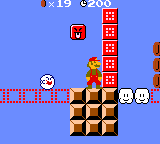
|
An overworld level with large and extensive Face Block sections. |
| World 1-2 | 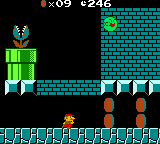
|
An underground level with design cues from World 1-2, including a fake version of its Warp Zone. |
| World 1-3 | 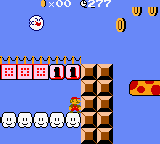
|
An overworld level with design cues from World 2-3 and World 4-3, with the bridge sections having no Cheep-cheeps and are two-layer with Dotted-Line Blocks on the top lane and cloud platforms below. |
| World 1-4 | 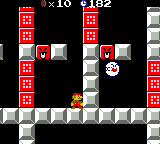
|
A castle-themed level with design cues from World 1-4 and World 3-4, but with no Fire-Bars or Podoboos, and has a Face Block labyrinth. |
| World 2-1 | 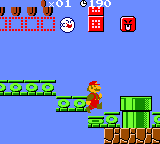
|
An overworld level with fairly normal gameplay, but also has two sections with many small trampolines. |
| World 2-2 | 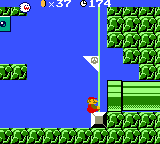
|
An underwater level similar to World 2-2. It has narrow passages to swim through and Spike Traps to get past. |
| World 2-3 | 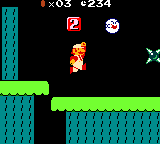
|
A level based on World 3-3 that has many walls and gaps to jump over, many of them with Spike Traps. |
| World 2-4 | 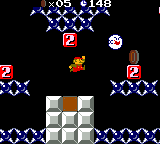
|
A castle level with several Spike Trap clusters, and a mid-section with many blocks spread around and unusual gaps. |
VS Game[edit]
This mode is almost the same as You VS. Boo, but it is not available on the 3DS Virtual Console port, due to no multiplayer support. By utilizing the Game Boy Color Link, two players can race head-to-head on a particular level. The levels are laid out identically to those featured in You VS. Boo mode. It is necessary to play this mode at least once to unlock two graphics in the Album. Only a few differences can be found between VS Game and You VS. Boo:
- Boo will not be found on any level as opponents.
- The players can use the Face Blocks to try to trap their opponents.
- Face Blocks do not turn themselves on automatically, as there is a human opponent that is able to toggle them.
- If Mario and Luigi loses a life simultaneously, the player with the most coins wins.[13]
Toy Box[edit]
The Toy Box contains a large variety of different toys for the player to use. The majority of the items in the Toy Box must be unlocked, generally through game completion.
Fortune Teller[edit]
The Fortune Teller is a bonus mode that is accessible from the very start of the game. The player enters the Fortune Teller, pick a random card, and receive a fortune. There are five different varieties of fortunes: Extremely Lucky, Very Lucky, Lucky, Unlucky, and Extremely Unlucky. The only way that the Fortune Teller can actually affect gameplay is if the player receives an Extremely Lucky fortune and starts a new file; they start the new game with 10 lives, instead of just five.
Mystery Room[edit]
The Mystery Room (or ? Room) is perhaps the most well-developed secret in the Toy Box. It contains a total of eight different options for the player to choose from. Each must be unlocked by rescuing a captive from a castle in Original 1985 mode. Whenever a Mushroom Retainer (or Princess Peach, as the case may be) is rescued from a castle, they will show up in the Mystery Room.
- World 1-4 Mushroom Retainer: Shows the player banners to print out on the Game Boy Printer.
- World 2-4 Mushroom Retainer: Shows the player animations.
- World 3-4 Mushroom Retainer: Shows the player banners to print out on the Game Boy Printer.
- World 4-4 Mushroom Retainer: Shows the player animations.
- World 5-4 Mushroom Retainer: Shows the player various graphics available for printing.
- World 6-4 Mushroom Retainer: Shows the player a certain mode that allows them to create a sort of story.
- World 7-4 Mushroom Retainer: Shows the player banners to print out on the Game Boy Printer.
- Princess Peach: Shown an introduction screen editor where the player can replace the "Super Mario Bros: since 1985." title screen with different images, and add custom text. Can also be used to change the song heard in the title screen.
Calendar[edit]
The Calendar is the only other feature that is located in the Toy Box to be accessible from the very start of the game. The main function of the calendar is to keep track of the days. The player could mark certain days on the calendar if they were a specific event, such as a birthday. The player can only mark 12 dates on the whole calendar. If the player wants to try to mark another, one of the dates has to be erased. It always has the same music as the Main Menu music.
Yoshi Is Here![edit]
By finding at least one Yoshi Egg in Challenge Mode, the player will unlock "Yoshi Is Here!", an optional feature helps the player find other Yoshi Eggs in various levels of Challenge Mode. It operates like a roulette, flashing random levels at a high speed. When the player presses , the screens will stop flipping. A brief snapshot will be shown of an area in a specified level, indicating that the level's Yoshi Egg can be found there; it is often near an object that did not appear in the original level. This mode has the same music as the Mystery Room menu.
Album[edit]
Awards[edit]
| Image | How to unlock | In-game comment |
|---|---|---|
 Bowser Award |
Complete the Second Quest of Super Mario Bros. | You finished the Star courses! |
 Mario Award |
Beat World 8-4 of Super Mario Bros. | Hooray! You cleared World 8-4! |
 Peach Award |
Get all Red Coins, High Score Medals, and Yoshi Eggs in Challenge Mode | You received all Challenge Medals! |
Toad Award |
Fill the total score meter on Challenge Mode (1,160,000 points) | You exceeded the Challenge Score! |
 Yoshi Award |
Beat World 8-4 of Super Mario Bros. for Super Players | You completed the Extra Courses! |
Printable icons[edit]
Every printable icon is unlocked when Mario or Luigi rescue a Toad in World 5-4 of the "Original 1985" mode (Super Mario Bros.). They can be printed from the Game Boy Printer.
Pictures[edit]
| Image | How to unlock | In-game comment |
|---|---|---|
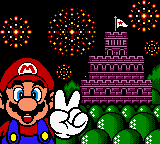
|
Make the Fireworks Show go off on at least one level | A Fireworks Show just for you! |
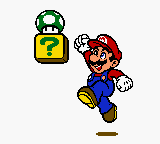
|
Collect a 1-up Mushroom | All right! You got a 1-up Mushroom! |
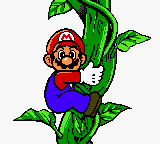
|
Climb a beanstalk and enter a Bonus Stage | You found the Bonus Stage! |
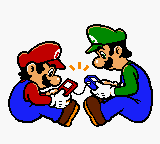
|
Play multiplayer mode with a friend once. (This image can not be rewarded in the 3DS Virtual Console port.) | You played your first VS GAME! |
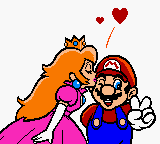
|
Complete Super Mario Bros. | You're a hero! You rescued Peach! |
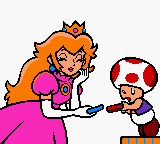
|
Use the infrared link at least once. (This image can not be rewarded in the 3DS Virtual Console port.) | You traded High Scores! Way to go! |
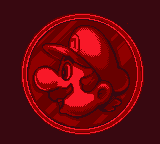
|
Find all Red Coins in Challenge mode | Good job! You got all the Red Coins! |
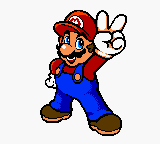
|
Get all the High Score Medals in Challenge mode | You got all the High Score medals! |
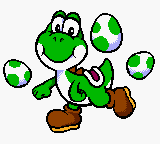
|
Find all of the Yoshi Eggs in Challenge mode | Wow! You found all the Yoshi Eggs! |
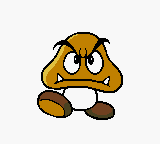
|
Defeat a Goomba | You stomped a Goomba! |
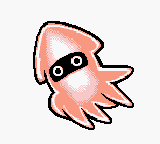
|
Defeat a Bloober | Way to go! You beat a Bloober! |
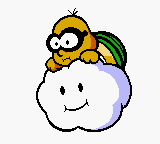
|
Defeat a Lakitu | You knocked Lakitu off his cloud! |
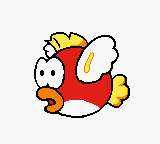
|
Defeat a Cheep-cheep | You beat a Cheep-cheep! Nice work! |
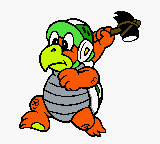
|
Defeat a Hammer Bro | You defeated the Hammer Bros! |
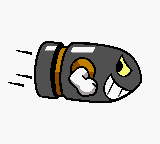
|
Defeat a Bullet Bill | You stomped Bullet Bill! All right! |
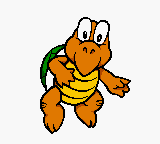
|
Defeat a Koopa Troopa | Great! You toppled a Koopa Troopa! |
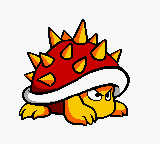
|
Defeat a Spiny | You defeated a Spiny! Yippee! |
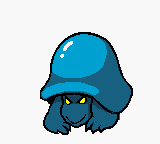
|
Defeat a Buzzy Beetle | Good job! You beat a Buzzy Beetle! |
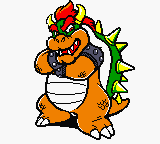
|
Defeat the first four fake Bowsers with fireballs in Super Mario Bros. The player unlocks a quarter of the picture for each Bowser defeated with fireballs. | You blazed the first 4 Bowsers! |
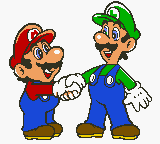
|
Defeat the last three fake Bowsers and the real Bowser with fireballs in Super Mario Bros. The player unlocks a quarter of the picture for each Bowser defeated with fireballs. | You blazed the last 4 Bowsers! |
Story Mode artwork[edit]
All of the Story Mode artwork is unlocked when Mario or Luigi rescue the Toad in World 6-4 of the "Original 1985" mode (Super Mario Bros.). These images can be printed with the Game Boy Printer.
Game Boy Printer banners[edit]
Each banner is unlocked by rescuing a Mushroom Retainer from one of the castle levels.
| Image | How to unlock |
|---|---|
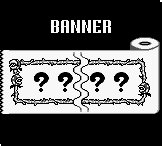
|
Rescue the Mushroom Retainer in the first castle of Super Mario Bros. |
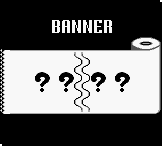
| |
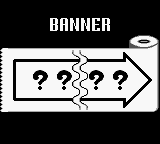
| |
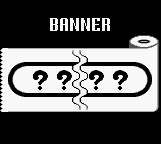
| |
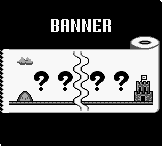
| |
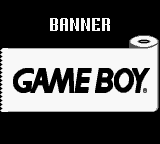
|
Rescue the Mushroom Retainer in the third castle of Super Mario Bros. |
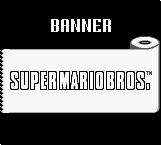
| |
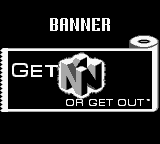
| |
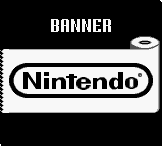
| |
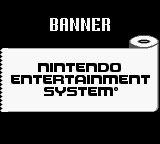
| |
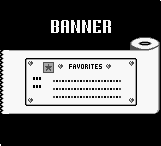
|
Rescue the Mushroom Retainer in the seventh castle of Super Mario Bros. |
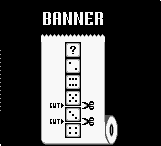
| |
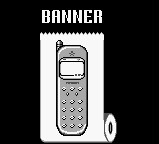
| |
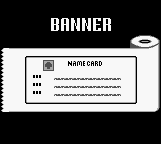
|
Staff[edit]
- Main article: List of Super Mario Bros. Deluxe staff
Original Game Design[edit]
Producer[edit]
- Masayuki Uemura
- Kazuhiko Taniguchi
Supervisor[edit]
- Shigeru Miyamoto
- Takashi Tezuka
- Toshihiko Nakago
Regional differences[edit]
The Japanese version was released nearly a year after the North American and European versions, and features some enhancements over earlier versions.
- In the Japanese release, when the player unlocks new album photos, a red and yellow-flashing icon reading "NEW" is shown next to the album icon from the mode select screen.
- The photo fragments on pages 4 and 5 of the album are not unlocked by using fireballs to defeat the fake Bowsers and Bowser in original mode. Instead, the eight fragments are rewarded for every four Red Coins collected in Challenge mode.
- The Ranking scoreboard plays the same theme from when printing from a Game Boy Printer.
- In the Japanese release, when saving the game progress, Mario and Luigi's current form and the player's current score are also saved. In the English version, when reopening a game, Mario and Luigi return to their small form, and their score is reset to zero.
- From the pause menu, if the player saves their game with a score high enough for the Records table, a large starburst saying "RANK IN!" appears.
- Some names on the Ranking screen were changed to their romanized Japanese name.
- "BOWSER" was changed to "KOOPA".
- "BOO" was changed to "TERESA".
- "LAKITU" was changed to "JUGEMU".
- "TROOPA" was changed to "NOKO2" (short for Koopa Troopa's Japanese name, Nokonoko). The "2" of the Ranking name is white, while "NOKO" is colored green.
- "TOAD" was replaced by "PAKKUN" (short for Piranha Plant's Japanese name for Pakkun Flower.
- "GOOMBA" was changed to "KURIBO".
- In the Japanese release, the Ranking scores can be reset if the player presses
.
- The Boo in the "You VS. Boo" mode was renamed to simply Ghost and has a different graphic.
- The record time for each level in "You VS. Boo" is saved.
- In Challenge mode, the minimum points requirement was changed for each of the first four worlds' levels, except World 2-3 and World 3-4.
Revision differences[edit]
- The Nintendo 3DS Virtual Console removes the ability to select Print or Trade in applicable menus. While the options show up, nothing happens when pressing
on the menu buttons.
Reception[edit]
Super Mario Bros. Deluxe was very well-received by both fans and critics.
| Reviews | |||
|---|---|---|---|
| Release | Reviewer, Publication | Score | Comment |
| Game Boy Color | Cameron Davis, GameSpot | 9.9/10 | "It looks like we finally have the "killer app" for the Game Boy Color, then. Worth buying a GBC just to play. Well done, Nintendo - now, where's Zelda and Metroid...?" |
| Game Boy Color | Craig Harris, IGN | 10/10 | "Super Mario Bros. remains one of my top 10 favorite games of all-time, even though it's almost a decade and a half old. Super Mario Bros. Deluxe is such a perfect translation, it makes me wonder if it's easy to port NES games to the Game Boy Color. Super Mario Bros. Deluxe is the Game Boy Color-specific game to own, hands down, and will be the title that, hopefully, will key a revolution of porting NES games to the handheld system. Buy this game. Now." |
| Nintendo 3DS | Marcel van Duyn, Nintendo Life | 6/10 | "All in all, Super Mario Bros. Deluxe is both a hit and a miss. The newly added features and included edition of Lost Levels give you some bang for your buck, but the decreased field of vision — a throwback to the Game Boy Color's small screen — hinders enjoyment of all modes quite a lot. To those who have played the original game and are interested in Deluxe's bonuses — or to those who got the game as a freebie — this is quite a nice little experience, but to anybody simply looking to get a portable version of Super Mario Bros., the already available original NES version is probably the smarter option." |
| Aggregators | |||
| Compiler | Platform / Score | ||
| GameRankings | 92.63% | ||
Sales[edit]
The game sold about 2.8 million copies in the United States.[14]
Gallery[edit]
- For this subject's image gallery, see Gallery:Super Mario Bros. Deluxe.
Sprite of Yoshi
Media[edit]
| File info |
| File info |
| File info |
| File info |
| File info |
| File info |
| File info |
| File info |
| File info |
| File info |
| File info |
| File info |
| File info |
Trivia[edit]
- A 2001 patent filed by Nintendo for a gaming smartphone used Super Mario Bros. Deluxe as an example of a built-in game. The patent called the game "Super Mario DX".[15]
- Mario's in-game sprite still wears the same colored attire for his shirt and overalls as he did in the original; Luigi wears a new dark/light green outfit while his original colored attire is now Fiery Luigi's outfit. However, the game's artwork and cutscenes depict Mario and Luigi wearing the standard colors of their shirts and overalls since Super Mario Bros. 3.
References[edit]
- ^ Nintendo: Game Boy Game List. Nintendo of America (American English). Archived April 27, 1999, 03:17:02 UTC from the original via Wayback Machine. Retrieved May 31, 2024.
- ^ Game Boy Color News Release sheet. Nintendo of America (American English). Archived July 25, 2019, 22:24:07 UTC from the original via Wayback Machine. Retrieved May 31, 2024.
- ^ https://www.nintendo.com/fr-fr/Jeux/Game-Boy-Color/Super-Mario-Bros-Deluxe-266219.html
- ^ https://www.nintendo.com/de-de/Spiele/Game-Boy-Color/Super-Mario-Bros-Deluxe-266219.html
- ^ https://www.nintendo.com/it-it/Giochi/Game-Boy-Color/Super-Mario-Bros-Deluxe-266219.html
- ^ SUPER MARIO BROS. DX. Nintendo (Japanese). Retrieved May 31, 2024.
- ^ McMinn, Kevin (January 27, 2014). Nintendo Japan Issuing Nintendo Network ID Campaign Download Codes. Nintendo News. Archived January 30, 2014, 00:42:54 UTC from the original via Wayback Machine. Retrieved May 31, 2024.
- ^ Super Mario Bros. Deluxe for Nintendo 3DS - Nintendo Game Details. Nintendo of America (American English). Archived January 21, 2017, 08:23:56 UTC from the original via Wayback Machine. Retrieved May 31, 2024.
- ^ December 21, 2014. More Classic Mario Games Coming to Virtual Console. Cubed3 (English). Retrieved May 31, 2024.
- ^ 1999. Super Mario Bros. Deluxe instruction booklet. Nintendo of America (American English). Page 2-3.
- ^ Pokemon Glitching And More (August 10, 2014). Super Mario Bros Deluxe How To Get Small Fire Mario or Luigi. YouTube. Retrieved May 31, 2024.
- ^ 1999. Super Mario Bros. Deluxe instruction booklet. Nintendo of America (American English). Page 20.
- ^ 2000. VS GAME. Nintendo of Japan (Japanese). Retrieved August 2, 2024.
- ^ The Magic Box - US Platinum Chart Games. The Magic Box (English). Archived June 5, 2004, 00:39:41 UTC from the original via Wayback Machine. Retrieved May 31, 2024.
- ^ November 27, 2001. Patent Description. Google Patents. Retrieved May 31, 2024.
External links[edit]
- North American web page (Wayback Machine)
- Japanese website
| Game Boy Color games | |
|---|---|
| Super Mario franchise | Super Mario Bros. Deluxe (1999) • Mario Golf (1999) • Mario Tennis (2000) • Mobile Golf (2001) • Mario Family (2001) |
| Donkey Kong franchise | Donkey Kong GB: Dinky Kong & Dixie Kong (2000) • Donkey Kong Country (2000) |
| Wario franchise | Wario Land II* (1998) • Wario Land 3 (2000) |
| Other | Game & Watch Gallery 2* (1998) • The Legend of Zelda: Link's Awakening DX* (1998) • Game & Watch Gallery 3* (1999) |
